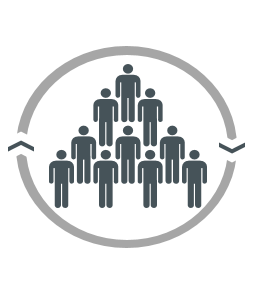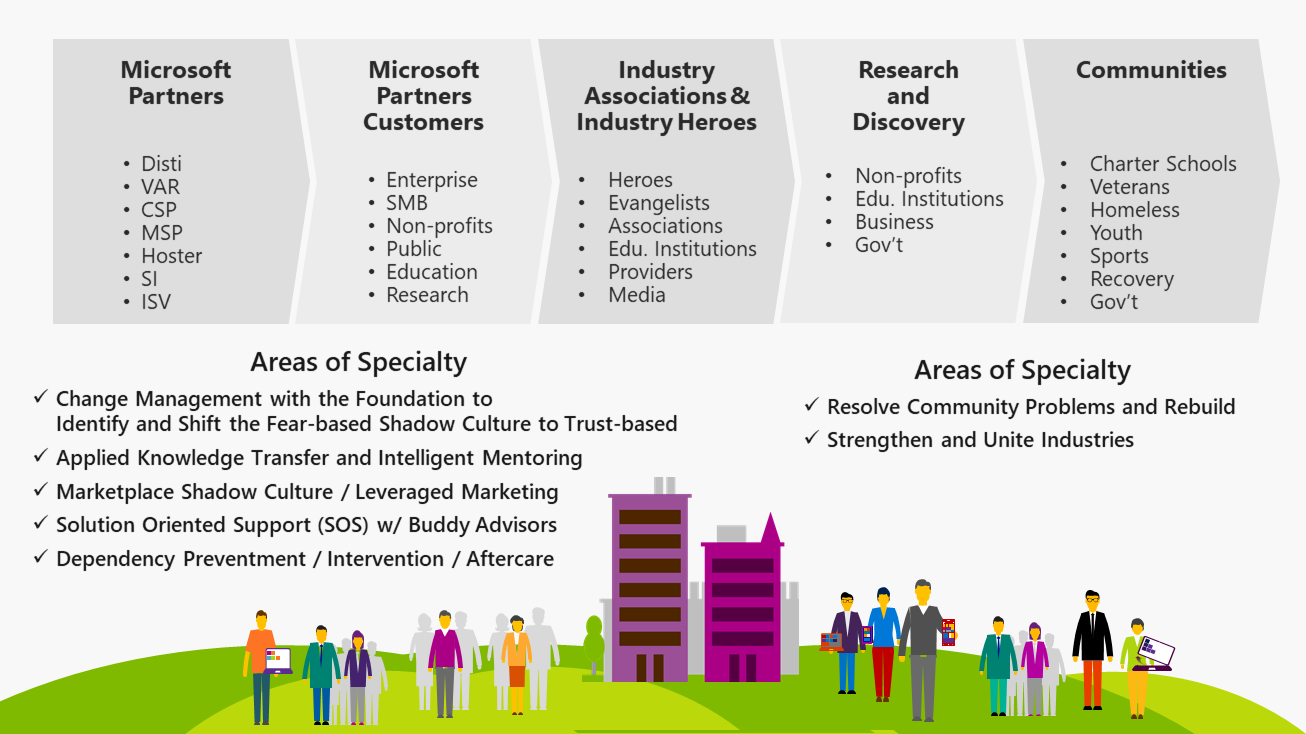…An adventure, discovery and platform that makes ideas and dreams happen.
PWI Co-Lab Institutes are purpose-driven entities. The structure and principles on which Co-Lab Institutes are formed support the development and growth of maturity and trust within the culture – promoting authority, responsibility and accountability. Like the principles and environment set forth and defined within the U.S. Constitution, the Co-Lab creates a similar environment of freedom, solidarity and sustainability. It ensures the passion, purpose and power of unity is always within the power of the people.
A Co-Lab™ is an App-based Collaboration eFabric.
This virtual collaboration tool wraps around and seamlessly weaves through the traditional structure of
an organization without disruption.
- Improved Perceptions
- Creative Critical Thinking
- Effective Communication
- Sentience Understanding
A Co-Lab™ is a platform plus process that evolves a tapestry of trust, solidarity productivity, dependability and social cultural responsibility.
In the Co-Lab Institute people work together and everybody has a VOICE in the what, why and how decisions are made and plans are set in motion. So like the founders of America, all Co-Lab Institute participants and contributors become invested in the long-term implementation and growth of the principles, plan and culture.
Co-Lab Institutes support the development of cultural, social and economic solutions for businesses, organizations, schools and families to prosper.
“Making the Dream Big Enough for Everybody.”
~Richard Jorgensen, PhD (hc)
Rooted in the principles of solidarity, Co-Lab Institutes bring together collective thinking into a structured process of collectively grasping and implementing solutions for the betterment of ALL STAKEHOLDERS.
When people enter a Co-Lab Institute they learn about and experience Four Core Principles. These principles set in motion the foundation of open, honest, selfless and communicative cultures focused on the collective goals, capable of true collaboration and creativity.
Co-Lab Institutes provide the skills and tools for creating organizations based on solidarity and collaboration:
- Research
- Collaboration
- Communication
- Media Development
- On-demand SOS Support
- Global Distribution Networks
- Confirmation Results and Research

People who write PWI Blogs share their insight and research. PWI Blogs are not about opinions, they represent research findings and facts.
WHY we write PWI Blogs?
In a world of turmoil and distrust PWI Co-Lab Blogs have developed a patent-pending process for blog writing that invites and engages people into a new defacto standard of writing style and publishing. This new style prevents the use of information for the fabrication of end results and requires complete disclosure and exposure of one’s thinking process. It’s a technological application of journalism that we are inducing that will have huge implications to the interface between the technical and the technology world.
We write PWI Blogs to set the stage for new methods of communication and cultural transformation.
Building
Local
Organizations
Great
WHAT PWI Blogs are about?
Blogs are about TOGETHER! ePublishing Collaboration Institutes (Co-Labs) are being formed to support Strategic Partnerships in a collaborative movement.
To
Organize
Great
Explorations
Together
Here – using all
Ecommerce
Resources – possible
Together we will explore and discern how to make great ideas happen…
As it has been said before:
- Captain Picard ~ “Make it so!”
- Larry the Cable Guy ~ “Get ‘er Done.”
- Spock ~ “Very logical.”
The question however, is often not what and why to do it... but, HOW to do it?
HOW PWI Blog’s are Structured?
Remember, we are a grassroots philosophy. Therefore, PWI Co-Lab Blogs give our community members and partners the place and space to find their VOICE and be heard: to take what you they see, hear and know, write about it and then present it in Online Discussion with local management, colleagues, friends and such…Giving Power to the People.
Writing Blogs: Increased Application of Principles:
- Problem:
- What to do: Define what happened (the situation)? (Provide an introduction to define a problem / dictation dealing with facts.)
- Why to do it: The problem provides the interest component of the 4 I’s, in which we use words, facts and evidence to communicate clear and logical points.
- How to do it: In examining the problem assess and discern the following:
- Is this problem really a problem?
- Is it necessary to solve it?
- Who pays the cost of the problem?
- Who benefits from the problem?
- Answer:
- What to do: Define the answer, the complement of the problem using principles (tell the the truth)
- Why to do it: The answer provides the information component of the 4 I’s in which we use pictures, examples and metaphors, principles to provide clarity and conviction in what we are communicating
- How to do it: In examining the answer assess and discern the following:
- Will the answer really solve the problem?
- Is the answer believable?
- Solution:
- What to do: Define an implementable solution (solution needed to have prevent the problem)
- Why to do it: The solution provides the imagination component of the 4 I’s in which we describe what would it be life if… In this instance, we use word pictures and stories to transform and transport someone to discovery, opportunities and possibilities.
- How to do it: In examining the solution assess and discern the following:
- Is the solution achievable?
- Can it really happen for me?
- Invitation: The solution ends with an invitation to come and discussion with others of like mind and purpose.
Questions To Ask Yourself as You Write Your Blog
Please Note: PWI has created an automated process within a Socratic Conversation Questionnaire know as a SocraticQ, which allows PWI Blog Contributors to capture their experiences, insights and wisdom in the structure and stages listed below. The process below is simply for understanding purposes.
- What I Experienced
- Share the event, situation, emotions and feelings that resulted.
——————————-
- Share the event, situation, emotions and feelings that resulted.
- What I Heard
- Share some Pocket Wisdom Insight content that helped you “see possibilities and opportunities” instead of hopelessness and fear.
- For example: I discovered the story within me…
-
- What I Thought
- The main content of my blog defines the:
- Problem
- Answer (compliment to the problem)
- Solution (principle-based practical solution to implement)
——————————-
- The main content of my blog defines the:
- What I Know Now
- As a result of what you discovered, how are you different today?
- What value have you gained from the discovery journey you experienced?
- For example, are you:
- Wise
- Smart
- Intelligent
- Confident
- Grounded
- Honest
- Selfless
- Pure in Your Intentions
- Living in Reality
——————————-
- As I Finish Writing this Blog, I am Reminded of Great Truths…
- The following two statements are included in all blogs, the third quote is the PWI Blog Contributors choice:
- “I think, there for I am” – Renee Descartes
- “Be the change I want to see” – Mahatma Gandhi
- [Author’s choice quote here]
——————————-
- The following two statements are included in all blogs, the third quote is the PWI Blog Contributors choice:
- Who I Am Now
- Closing statement should include (but is not limited to) the following:
- Today I am a PWI contributor. I invite you to join me in this Co-Lab to explore and discover a new tomorrow we will create together.
——————————-
- Today I am a PWI contributor. I invite you to join me in this Co-Lab to explore and discover a new tomorrow we will create together.
- Closing statement should include (but is not limited to) the following:
- What I Thought



